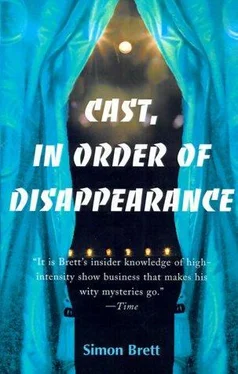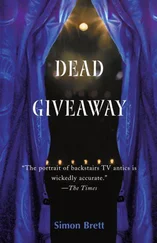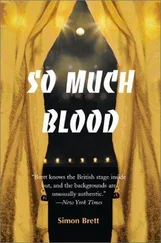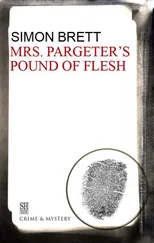Simon Brett - Cast in Order of Disappearance
Здесь есть возможность читать онлайн «Simon Brett - Cast in Order of Disappearance» весь текст электронной книги совершенно бесплатно (целиком полную версию без сокращений). В некоторых случаях можно слушать аудио, скачать через торрент в формате fb2 и присутствует краткое содержание. Жанр: Классический детектив, на английском языке. Описание произведения, (предисловие) а так же отзывы посетителей доступны на портале библиотеки ЛибКат.
- Название:Cast in Order of Disappearance
- Автор:
- Жанр:
- Год:неизвестен
- ISBN:нет данных
- Рейтинг книги:3 / 5. Голосов: 1
-
Избранное:Добавить в избранное
- Отзывы:
-
Ваша оценка:
- 60
- 1
- 2
- 3
- 4
- 5
Cast in Order of Disappearance: краткое содержание, описание и аннотация
Предлагаем к чтению аннотацию, описание, краткое содержание или предисловие (зависит от того, что написал сам автор книги «Cast in Order of Disappearance»). Если вы не нашли необходимую информацию о книге — напишите в комментариях, мы постараемся отыскать её.
Cast in Order of Disappearance — читать онлайн бесплатно полную книгу (весь текст) целиком
Ниже представлен текст книги, разбитый по страницам. Система сохранения места последней прочитанной страницы, позволяет с удобством читать онлайн бесплатно книгу «Cast in Order of Disappearance», без необходимости каждый раз заново искать на чём Вы остановились. Поставьте закладку, и сможете в любой момент перейти на страницу, на которой закончили чтение.
Интервал:
Закладка:
Steen continued presenting revues, with an increasing reliance on scripted comedy rather than just dancing girls, until the outbreak of war. Then he moved into the cinema and, with his customary unflagging energy, set up a series of films in keeping with the jingoistic spirit of the times. Of these the most memorable was Brothers in Battledress, directed by William Hankin.
After the war Marius Steen continued to put on shows and gradually he forsook revue for musicals and light comedies. What’s in the Box? was one of the greatest successes of 1953, and in 1960 Steen’s purchase of the King’s Theatre off Shaftesbury Avenue heralded a string of commercial triumphs, including One Thing After Another, which ran for three years, and, currently, Sex of One and Haifa Dozen of the Other.
Steen maintained his interest in the cinema and put money into many ventures including the highly successful Steenway Productions, which make horror films. He was also a major shareholder in three commercial television companies, and was at the time of his death interesting himself in the production of programmes for network on the new commercial radio station.
Marius Steen was often criticised for his healthy disrespect for ‘Art’ and there are many stories of this supposed philistinism which he loved to tell against himself. (On first hearing of Michelangelo, he is reputed to have asked ‘Michael who?’ His alleged description of opera as ‘fat gits singing’ is probably apocryphal.) He was a forthright man who made enemies, but was loved and respected by his friends. He had no hobbies, maintaining that if a person needed hobbies, then there was something wrong with his work. He divided his time between his houses in London and Streatley and a villa in the South of France. In 1969 he was awarded the CBE for services to the theatre.
Marius Steen married Rose Whittle in 1934. She died in 1949 and he never remarried. He leaves a son.
Charles was impressed. It was quite an achievement for anyone in the theatre to command that many column inches in The Times. The obituary seemed like a washing of the body. It cleaned Steen up. The existence of the photographs, all the sordid aspects of the man’s life were rinsed away by the formalised prose. The Western ritual of death was observed-the obligation to remember the most dignified image of the deceased. Like those ghastly American mausoleums where the embalmed corpse is presented at its best, dressed and smiling, prior to burial. But Charles had a nagging feeling that, however Marius Steen was tarted up in death, his corpse would not lie down.
Charles arrived at the Archer Street flat with a two-litre bottle of Valpolicella from Oddbins and a determination to be very slow on the uptake in any discussion of Steen’s death. Jacqui looked ghastly when she opened the door. Her face was pale and her eyes were puffy red slits.
‘Are you all right?’
‘I will be, Charles. I’ll just sit down for a moment.’
‘Can I get you a drink?’
‘No. It’d make me sick. But help yourself.’
The events of the last few days had made Charles forget about Jacqui’s flat being done over, but inside it the evidence was all too clear. She had obviously made some attempt to tidy up. There were two cardboard boxes in the middle of the room full of bits of glass and torn clothes. But the curtains were still hanging shredded from their rails, and the bed smelt of oil from the smashed lamp. The little room looked sad and crippled.
He didn’t make any comment, but found an unbroken glass and filled it with Valpolicella. ‘Do you want to go out to eat, Jacqui?’
‘No, I couldn’t.’
‘Hmm.’ The silence was obtrusive. Feebly he repeated himself. ‘Do you feel all right?’
‘Charles, the bloke I loved and whose kid I’ve got has just been murdered.’
‘I’m sorry.’ He stolidly avoided reacting to the word ‘murdered’. Jacqui softened. ‘I’ll get you some food later. When I can face it.’
‘Don’t worry about that. Not particularly hungry.’
‘No.’ Again they were conscious of the silence. Then Jacqui burst out. ‘He always was a little sod.’
Charles was genuinely amazed. ‘Who?’
‘Nigel.’
‘Nigel Steen?’
‘Well, who else?’
‘Why do you suddenly bring him in?’
‘Because he killed Marius, that’s why.’
This new direction of thought was too sudden for Charles to take in. Deliberately, he slowed down. ‘What on earth do you mean? You haven’t got any reason for saying that.’
‘Of course I have. Who else stood to get anything out of Marius’ death?’
‘I don’t know. I would have thought Nigel was doing all right anyway. He didn’t need to murder anyone. Presumably he’d have got everything when his father went. He only had to wait.’
‘He’s greedy. Anyway, things may have changed. Maybe he had to move fast.’
‘What do you mean?’ Charles asked patiently, determined to humour her through this crazy new idea.
‘Marius was thinking of changing his will in favour of me and the baby.’
‘Oh yes.’ Charles tried to sound believing, but failed.
‘Yes, he bloody was. He was even talking about us getting married.’
‘When was this?’
‘First in the South of France. Then when I told him about the baby he was more definite. He said he’d felt awful about the abortion last time, and he wanted to keep this one and marry me and start again.’
‘And cut Nigel out of the will?’
‘I suppose so.’
It didn’t sound very plausible. Even if Steen had ever had such intentions, the events of the last week made it clear that he had changed his mind. And the whole idea of remarriage and disowning Nigel was the sort of novelette situation that would appeal to Jacqui. Still, he couldn’t be completely brutal with her. ‘Why didn’t you mention this before?’
‘It was a secret. Between Marius and me. It was all going to be secret. Even when we married it was going to be a secret for a bit. But now he’s dead…’ She broke down.
Charles calmed her and forced her to drink a little wine. But when she was composed again, he felt he had to be cruel. If Steen had been murdered (and he had no cause to believe that that was the case), then it was something to do with the Sweets and the blackmailing business. It was dangerous for Jacqui to go around blaming his son. She was quite capable of going to the police and making accusations which, since she hadn’t a shred of evidence, could only lead to trouble. This nonsense had to be stopped.
‘If what you say is true, how do you explain Steen’s behaviour during the past week? Hardly the actions of a devoted husband-to-be.’
He could see from her face that that really hurt, and also that it was something she hadn’t been able to work out satisfactorily for herself. ‘Well, Nigel kept him from me. Marius went off to Berkshire-where he didn’t want to be disturbed. He’d often do that,’ she added defensively, ‘go off with a great pile of scripts, looking for his next show. And then Nigel left all those messages for me.’
‘And he sent the note?’
‘Yes.’
‘Pity I burnt it. We could have got the handwriting analysed,’ he said sceptically.
‘That note’s just the sort of thing the little sod would do.’
‘Jacqui, why, if Nigel had decided to kill his father anyway, did he bother to give the impression you were out of favour?’
‘So that, when he’d done it, nobody would believe me when I said about us getting married. They’d think we’d had a quarrel.’
It was ingenious, but Charles didn’t feel very inclined to accept the reasoning. ‘All right then, when did Nigel do the murder?’
‘Sunday evening. When he says he found the body.’
Читать дальшеИнтервал:
Закладка:
Похожие книги на «Cast in Order of Disappearance»
Представляем Вашему вниманию похожие книги на «Cast in Order of Disappearance» списком для выбора. Мы отобрали схожую по названию и смыслу литературу в надежде предоставить читателям больше вариантов отыскать новые, интересные, ещё непрочитанные произведения.
Обсуждение, отзывы о книге «Cast in Order of Disappearance» и просто собственные мнения читателей. Оставьте ваши комментарии, напишите, что Вы думаете о произведении, его смысле или главных героях. Укажите что конкретно понравилось, а что нет, и почему Вы так считаете.












